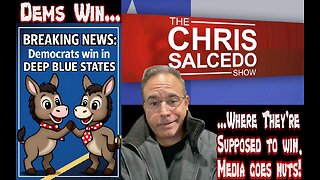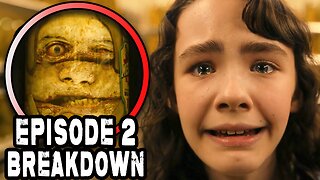Premium Only Content

Lights Out January 26, 1938 - Oxychloride X
"Oxychloride X," an episode of the radio horror series Lights Out, aired on January 26, 1938, over the NBC Red Network. Written by Arch Oboler, this science fiction horror tale explores the catastrophic consequences of unchecked ambition. The story centers on a brilliant but embittered college student, rejected by a fraternity, who invents a super-corrosive substance called Oxychloride X, a universal solvent capable of dissolving any material. Lacking a container to hold it, the substance begins eating through everything—metal, stone, and eventually the Earth’s crust. As it bores deeper, it unleashes monstrous creatures from beneath the planet’s surface, amplifying the chaos. The episode builds tension through vivid sound effects, like sizzling corrosion and unearthly roars, culminating in a grim warning about the dangers of reckless scientific discovery. Oboler’s narrative blends psychological depth with visceral terror, making it a standout in the series.
Cast and Crew
Cast:
Lead actors: Likely included Boris Karloff, Mercedes McCambridge, or other NBC radio regulars (specific actors for this episode are not documented, but Karloff was a frequent performer in 1938)
Supporting roles: Filled by NBC stock players, possibly including Lou Merrill, Betty Winkler, or Joseph Granby
Announcer: Not explicitly credited, likely an NBC staff announcer
Crew:
Writer/Director: Arch Oboler (primary creative force behind Lights Out in 1938)
Producer: NBC Red Network, overseen by Arch Oboler
Music: NBC house orchestra, likely arranged by Leith Stevens or another network composer
Sound Effects: NBC sound effects team, using innovative techniques like chemical fizzing sounds or amplified dripping for the corrosive solvent
Note: Exact cast and crew details for this episode are not fully documented. The above is based on Lights Out’s standard production team and recurring actors during the 1938 season, with Karloff’s involvement noted in sources for that period.
News in the United States (Week of January 26, 1938)
Economic Recession: The "Roosevelt Recession" deepened, with unemployment at 17.4%. President Franklin D. Roosevelt faced criticism over New Deal policies, prompting calls for increased public works spending.
Labor Struggles: The United Auto Workers clashed with Ford Motor Company in Detroit, with strikes reported over union recognition. Violence between strikers and company security drew national attention.
Aviation Developments: The Civil Aeronautics Authority was debated in Congress, aiming to regulate air travel safety. A Pan American Airways Clipper set a speed record for a transpacific flight to Hawaii.
Political Tensions: Isolationist sentiment grew as Congress debated military budgets. Roosevelt urged preparedness amid global unrest, but many Americans opposed foreign entanglements.
Cultural Note: The film Snow White and the Seven Dwarfs, released in December 1937, continued its box-office dominance, captivating audiences with its groundbreaking animation.
News in the World (Week of January 26, 1938)
Spanish Civil War: Franco’s Nationalists gained ground in the Battle of Teruel, with heavy casualties on both sides. German and Italian aid to Franco intensified, while Soviet support for Republicans waned.
Sino-Japanese War: Japan’s invasion of China saw brutal advances, with Nanjing still reeling from the December 1937 massacre. Japanese forces targeted Chinese resistance in Shandong Province.
Nazi Germany: Adolf Hitler consolidated power, dismissing moderate military leaders like General Werner von Fritsch. Preparations for the Anschluss with Austria were underway, with propaganda campaigns escalating.
British Diplomacy: Prime Minister Neville Chamberlain pursued appeasement, seeking talks with Hitler and Mussolini. The resignation of Foreign Secretary Anthony Eden (February 20) loomed, reflecting policy divides.
Soviet Purges: Stalin’s Great Purge continued, with the trial of the “Anti-Soviet Bloc” targeting figures like Nikolai Bukharin. Mass executions weakened Soviet leadership.
-
 LIVE
LIVE
The Chris Salcedo Show
12 hours agoDems Win In Dem States...And They Celebrate?
738 watching -
 1:04:43
1:04:43
Crypto Power Hour
10 hours ago $0.03 earnedPsychology Of Crypto Market Cycles
21.9K6 -
 9:58
9:58
Clintonjaws
12 days ago $0.11 earnedKaroline Leavitt's Response To 'The View' Host's Nasty Attacks Is Perfect
12.2K13 -
 24:23
24:23
World2Briggs
19 hours ago $0.01 earnedTop 10 Towns You Can Retire on $1900 a month in the Pacific North West.
8.56K7 -
 21:23
21:23
Lady Decade
16 hours ago $0.03 earnedThe Lost Sega Neptune Console Refuses To Die !
14.3K3 -
 17:14
17:14
ThinkStory
21 hours agoIT: WELCOME TO DERRY Episode 2 Breakdown, Theories, & Details You Missed!
13.2K -
 17:25
17:25
Real Estate
1 month agoThe Job Market Collapse IS HERE
14.7K12 -
 2:04:54
2:04:54
BEK TV
1 day agoTrent Loos in the Morning - 11/05/2025
11.6K1 -
 LIVE
LIVE
The Bubba Army
23 hours agoUPS PLANE EXPLODES - What Went Wrong? - Bubba the Love Sponge® Show | 11/05/25
1,210 watching -
 16:38
16:38
James Klüg
21 hours agoFOOD STAMPS RAN OUT, Will People Loot?
26K34